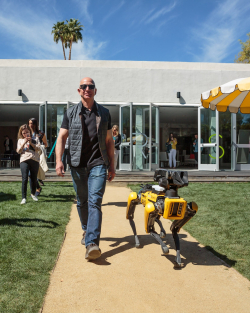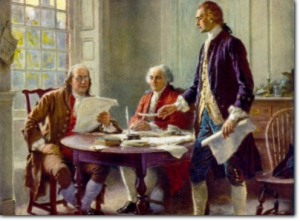
It began among capitalists.
Democracy is essential because it lets people change their minds and, upon changing them, reform the institutions that control their lives. That’s what the Declaration of Independence is about. It argues that despotic systems must be overthrown when they threaten our “life, liberty” or pursuit of happiness.
Many people, including me, have argued that the current attack on democracy began with The Jim Crow Project.
But long before one of our major political parties abandoned democracy, business did. It happened as these things usually do, with the very best of intentions.
As I noted last week, the system that came into effect in 1789 had only property owners voting. The true genius of succeeding generations has been to expand the right to vote, thus the pool of those who can effect change, to more and more people. This work continues, and it’s important.
But there’s another kind of democracy, corporate democracy. It may be even more important than electoral democracy because even functional democracies operate by the Golden Rule – he who has the gold makes the rules.
Before we can hope to have electoral democracy, then, we must have corporate democracy.
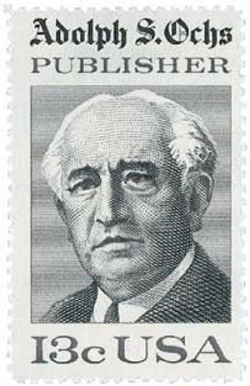
In practice it means that A.G. Sulzberger, born in 1980, became the hereditary publisher of the Times in 2017. “The New York Times is not for sale,” he said last year, and reporters breathed a sigh of relief.
They shouldn’t have. A.G. Sulzberger has no more qualifications than I do to be the publisher of The New York Times, save his name. He is an absolute monarch. His word is law, unless it defies that of his family, whose trust owns those Class B shares. (Cue the Borgia music.)
There are people I know and (usually) trust who praise God almighty for this. But it’s a precedent that has become common in the media business. Most of our media moguls are hereditary Kings, defiant of democratic norms. Is it any wonder that they tend not to support reform?
The worst of these is Rupert Murdoch, who defeated an attempt to end the two-class share structure at Fox as recently as 2017. Rupert Murdoch is as much an emperor as the King of Saudi Arabia, and his designated successor, Lachlan, will succeed him, just as MBS will succeed King Salman. That may be why Fox gets along so well with autocrats.

I say, stop worrying about Trump. Stop worrying about the Republican Party. Worry about Rupert Murdoch. Worry about Lachlan Murdoch. If you want to remove the chains binding you to a system that rewards the few over the many, end dual-class shareholding.
It’s bad enough when the news you read and see is controlled by hereditary monarchs. This dual-class menace has now spread to the general economy, particularly the tech economy that is my beat.
You can’t take the Fords out of Ford Motor. Only bankruptcy can. You can’t take out Larry Page and Sergey Brin at Google. They control the voting shares. Under Armour, Blue Apron, and Snapchat are among the other companies that have adapted this structure, to protect the founders (and by extension their families) from the ravages of the market.
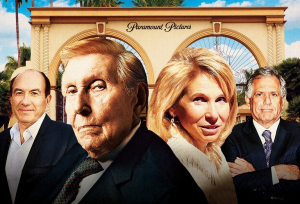
When most people argue about this issue, they mistakenly focus on its financial aspects. After all, Blue Apron and Snapchat are doing poorly. But the relative merits of these companies, as well as Comcast, Liberty Media, DISH Network, and Viacom, which also share this “structure,” misses the point.
The point is that ownership should represent ownership. If I buy a share of common stock, it should be the same as any other share of common stock. The real owners of dual share companies, the people who have invested the most money in them, don’t control them, and while the result might be destruction of value, as in the case of Viacom, that’s not the point.
Democracy is the point. Letting capitalism work is the point. If capitalism rules democracy, and it does, and if capitalism is based on hereditary power by people who didn’t earn their positions, then corporate democracy will, in time, destroy the other kind.
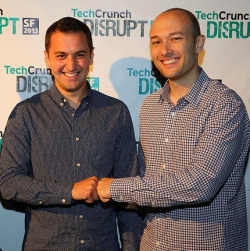
The attraction of becoming a prince, and of making your 22nd century heirs into Sulzbergers, is irresistible given the lack of political pushback. That’s why Lyft, which is now preparing to go public, plans its own dual-share structure. Absolute power will be lodged in co-founders Logan Green and John Zimmer, who have just 0.05% of the common, but will have voting control.
This is how the march to feudalism works. It’s how every pernicious trend works. It starts small. It may even start with good intentions, like protecting the newsroom from a buy-out, allowing reporters to do their jobs without fear or favor.
But that’s never how it ends. At some point, evil ideas must be confronted. When they’re proven to be evil ideas, when evil people use these ideas to evil ends, then it’s up to the rest of us to do something. Or suffer the consequences.
Corporate democracy is as important as electoral democracy. If we don’t fight for it, it will swallow the other kind of democracy.
Thanks to Rupert Murdoch, it already has.


